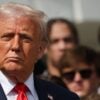It has been widely reported that federal prosecutors are nearing a final decision about whether to indict former top FBI official Andrew McCabe.
That would be a highly unusual event, although perhaps appropriate, given the facts.
A 21-year FBI veteran, McCabe served for two years as deputy director and also served as acting director for nearly three months after President Donald Trump fired James Comey, and prior to current Director Christopher Wray’s confirmation.
The Daily Signal depends on the support of readers like you. Donate now
The basis for any charges that may be filed were laid out in a withering report issued in February 2018 by Department of Justice Inspector General Michael Horowitz, who concluded that McCabe “lacked candor” in connection with a leak investigation that the bureau was conducting.
Lack of candor, defined as “[k]nowingly providing false information when making a verbal or written statement,” constitutes a violation of two provisions that are applicable to the FBI’s internal disciplinary process: Offense Code 2.5, when the statement was made not under oath to “a supervisor, another bureau employee in an authoritative position, or another governmental agency,” and Offense Code 2.6, when the statement was made under oath.
McCabe, who recently signed on with CNN as a contributing analyst, was fired by then-Attorney General Jeff Sessions on March 16, 2018, two days before his scheduled retirement. Sessions said that his decision was based on the inspector general’s report.
In a lawsuit filed last month against the Justice Department and the FBI, however, McCabe claims that his termination was politically motivated and the result of pressure applied by the president because of McCabe’s role in overseeing Operation Crossfire Hurricane, the FBI’s investigation into possible links between Trump campaign officials and Russian officials who attempted to interfere with the 2016 presidential election.
McCabe’s legal team—headed by former Justice Department Inspector General Michael Bromwich, who also recently represented Christine Blasey Ford during the Brett Kavanaugh Supreme Court confirmation hearing—has had separate meetings with Jessie Liu, the U.S. attorney for the District of Columbia, and Jeffrey Rosen, the deputy attorney general, in a last-ditch effort to try to talk the Justice Department out of prosecuting McCabe, presumably for lying to a federal agent in violation of 18 U.S.C. § 1001.
What Happened and When
So what is this all about? The inspector general’s report provides a detailed timeline of events.
In 2016, in the run-up to the hotly contested presidential election, the FBI was conducting two separate investigations that potentially implicated Hillary Clinton, stemming from her tenure as secretary of state—one involving her alleged misuse of a private email server to receive, store, and transmit classified information (Operation Midyear Exam) and the other involving an alleged pay-to-play scandal involving the Clinton Foundation.
McCabe played a significant role in overseeing both investigations.
On July 5, 2016, Comey publicly announced that the FBI was going to recommend against filing charges against Clinton for her misuse of a personal server. (Comey’s conduct related to Operation Midyear Exam was also the subject of a harsh report issued by the inspector general’s office in June 2018.)
Two days later, before the House Oversight and Government Reform Committee, Comey declined to confirm or deny whether the FBI was investigating the Clinton Foundation. He did the same before the House Judiciary Committee on Sept. 28.
Between Comey’s congressional appearances, McCabe received a telephone call on Aug. 12 from the principal associate deputy attorney general, reputed to be Matthew Axelrod, who reported to then-Deputy Attorney General Sally Yates.
According to McCabe, the principal associate deputy attorney general was angry at McCabe because it had come to his attention that the FBI was still pursuing the Clinton Foundation investigation—a matter that the Justice Department considered dormant—during the election season.
McCabe, who described the call as “very dramatic” and unprecedented, says that he pushed back, asking, “Are you telling me that I need to shut down a validly predicated investigation?” After a pause, the principal associate deputy attorney general responded, “Of course not.”
According to the inspector general’s report, both individuals confirmed the substance of this conversation, although the principal associate deputy attorney general stated that he thought the “bureau was trying to spin the conversation as some evidence of political interference, which was totally unfair.”
On Oct. 23, the Wall Street Journal published an article by Devlin Barrett (now with the Washington Post), “Clinton Ally Aided Campaign of FBI Official’s Wife,” stating that a political action committee run by then-Virginia Gov. Terry McAuliffe, a close Clinton confidant, and the Virginia Democratic Party had contributed more than $675,000 to the unsuccessful state Senate campaign of McCabe’s wife, Jill, at the same time that McCabe was “running the FBI’s Washington, D.C., field office, which provided personnel and resources to the Clinton email probe.”
The next day, Oct. 24, Barrett contacted the assistant director in charge of the FBI’s Office of Public Affairs to say that he was working on a follow-up story covering McCabe’s oversight of the Clinton Foundation investigation (the existence of which the FBI still had not confirmed) and potential connections with McAuliffe’s campaign contributions to McCabe’s wife.
On Oct. 25, McCabe instructed the Office of Public Affairs and FBI Special Counsel Lisa Page to call Barrett and act in “receive mode” to find out as much as they could.
On Oct. 26, McCabe participated in a heated conference call in which then-Attorney General Loretta Lynch “ripped” the assistant director in charge of the FBI’s New York field office about leaks to the press (although the focus of that call related to leaks over the investigation into the unrelated death of Eric Garner).
On the morning of Oct. 27, Comey held a meeting with the reassembled investigative team following the discovery of new Clinton-related emails on a laptop belonging to Anthony Weiner, who was married at the time to Huma Abedin, vice chair of Clinton’s 2016 presidential campaign and former deputy chief of staff to Clinton when she was secretary of state.
Comey insisted that McCabe drop off the call because of the “appearance issues” following the Wall Street Journal article, although McCabe’s recollection as to why he was told to leave the call differed from Comey’s.
Early that same afternoon, McCabe spoke to Page, who told him that Barrett had a confidential source who told him that McCabe had issued an order to the investigating agents to “stand down” on the Clinton Foundation probe until after the presidential election, implying that McCabe wanted to terminate the investigation for an improper purpose.
McCabe reminded Page about his Aug. 12 call with the principal associate deputy attorney general, which he believed was completely inconsistent with this “incredibly damaging” allegation, and authorized Page to call Barrett to tell him about that call. Text and phone records confirm that Page and McCabe communicated with each other several times that day and the next.
On Sunday, Oct. 30, Barrett’s follow-up story, “FBI in Internal Feud Over Hillary Clinton Probe,” was published. The article not only laid bare the evident tensions that existed between the top brass at the FBI and the Department of Justice, but it also tacitly acknowledged the existence of an ongoing investigation involving the Clinton Foundation.
That same day, McCabe made two calls to FBI officials in the New York office and admonished them for the leaks contained in the follow-up article. At no time did he tell either official that he was the one who had authorized Page to leak this information to the Wall Street Journal.
The next morning, Comey convened a staff meeting, which McCabe attended, in which Comey said they “[n]eed to figure out how to get our folks to understand why leaks hurt our organization”—a somewhat ironic and rich statement in light of the recent inspector general report taking Comey to task for doing the same thing.
On Tuesday, Nov. 1, McCabe formally recused himself from further involvement in the Clinton Foundation investigation, but that did not stop him from initiating yet another “angry” call about leaks with the head of the FBI’s New York office three days later following another story by Barrett, in which the account of McCabe’s call with the principal associate deputy attorney general was repeated.
Thereafter, the FBI began a leak investigation, which was eventually taken over by the Justice Department’s inspector general.
McCabe’s Account
According to contemporaneous notes prepared by the interviewing agents, on May 9, 2017, during an interview with the FBI Inspection Division, McCabe denied knowing who the source of the leak was—which was not true.
And again on July 28, 2017, during an interview under oath with the Office of Inspector General, McCabe—who was shown copies of text messages between Page and an assistant director, which suggested that Page might have provided the information to Barrett—said he was not aware that anyone had authorized Page to leak the information, and that he was unaware of her activities at that time. That, too, was not true.
It was not until several days later, on Aug. 1, that McCabe called the Office of the Inspector General to say he might have authorized Page to speak to Barrett. During a subsequent interview on Nov. 29, McCabe stated that “on further recollection,” after spending “a lot of time thinking about it,” he finally recalled authorizing Page to speak to Barrett and that he “misspoke” during his July 28 interview.
What transpired, if anything, to refresh his memory is not clear, although one could speculate that, having been shown Page’s text messages, McCabe might have reached the conclusion that the inspector general already knew or strongly suspected that he had authorized the leak, so he decided to correct his story in an attempt to avoid getting himself into further trouble.
McCabe also denied having told the FBI agents on May 9 that he had not authorized the leak about his call with the principal associate deputy attorney general to the Wall Street Journal, and that he may have been confused by their questions about the Oct. 30 article.
McCabe also claimed during the Nov. 29 interview that he suddenly recalled a one-on-one conversation with Comey following the Oct. 31 staff meeting. McCabe said he told Comey he had authorized Page to disclose the account of the Aug. 12 call to Barrett because he thought it was a “good” idea to rebut the narrative that the FBI was succumbing to political pressure, even though he recognized that the upper echelon of the Justice Department would likely be angry about the disclosure.
Of course, the person who stood to suffer the most in terms of damage to his reputation from a story that McCabe—whose wife had received more than $675,000 in campaign donations from a Clinton confidant—had instructed agents to shut down a probe into the Clinton Foundation during an election year was McCabe himself.
According to McCabe, Comey “did not react negatively, just kind of accepted it.” Comey, who says that he was concerned about the impact that the disclosure might have on FBI-Justice Department relations, among other things, vehemently denies this. Comey claims that, if anything, McCabe tried to give him the exact opposite impression, that he was also angry about the leak, and did not know its source.
As the higher-ups in the Justice Department consider whether to file charges against McCabe, one of the factors that may weigh on their minds is the impression—if McCabe is not charged—that there is a two-tiered justice system. If you are George Papadopoulos or Michael Flynn, and you lie to an FBI agent, you get charged; but if you are Andrew McCabe, a high-ranking FBI official, and you lie to an FBI agent, you get away with it.
Key Factors Ahead
So what happens if McCabe is charged? Will this be an easy case for the government to win? No, it will not.
First, while McCabe’s decision to authorize Page to leak information to the Wall Street Journal was dreadful and may well have violated FBI policy, which generally prohibits the disclosure of non-public information unless it is in the “public interest” (not McCabe’s personal interest), McCabe was, in fact, one of the few high-ranking officials authorized to speak to the media (and arguably to authorize others to do so, too) on behalf of the FBI.
Second, it will be the government’s burden to prove to all 12 members of a jury that McCabe knowingly and intentionally lied during those interviews. This is never an easy burden to carry. McCabe will claim that he was confused, misremembered, or misspoke, which people do all the time. Whether the jury will believe the government’s evidence, or McCabe’s defense, is anyone’s guess.
Third, it has been reported that while Page informed the grand jury that McCabe authorized her to leak the information about the Aug. 12 call between McCabe and the principal associate deputy attorney general, she thinks that McCabe had no reason to lie about it after the fact.
Why is that significant? While the government can certainly point to a strong motive for McCabe to lie—because he knew Comey would never have approved the leak and because he knew that the leak served his personal interests, but not the public’s interest—it is unclear what impact Page’s testimony will have on the jury tasked with deciding whether McCabe lied during his interviews.
Fourth, D.C. juries are notoriously liberal. Trump, whom McCabe blames for his termination and legal troubles, is not exactly overwhelmingly popular in the District of Columbia.
In 2016, Trump garnered a mere 4.1% of the popular vote in the District, the lowest total received by a Republican candidate since voters in the District were granted the right to vote in presidential elections. If there is a trial, and the defense can somehow make this a trial about Trump, they may have the upper hand because of the jury pool.
And fifth, the president’s sustained public attacks against McCabe may well inflame a jury and persuade them that McCabe’s claim that his termination and any indictment are retaliatory and more reflective of hatred by Trump, rather than any purposeful misconduct by McCabe, is worthy of belief.
If there is a trial, the government will try to limit any mention of Trump’s tweets and public comments about McCabe, and focus the jury on McCabe’s conduct. The defense, on the other hand, will try to persuade the judge that all of Trump’s conduct is relevant and admissible, as it is central to McCabe’s defense that he was fired and indicted purely for political reasons.
How a judge would rule remains to be seen.
Regardless of what happens here, there may still be other shoes to drop. Inspector General Horowitz and John Durham, the United States attorney for the District of Connecticut, are still investigating potential abuses of the Foreign Intelligence Surveillance Act process and the origins of Operation Crossfire Hurricane.
Both Comey and McCabe will, no doubt, feature prominently in whatever happens when the results of those investigations are revealed.






























